Call for Abstracts – ISMB/ECCB 2019
Abstract Submissions Closed
- Abstracts – Talks and Posters: About
- Tracks: Communities of Special Interest (COSIs)
- Abstracts Talks and Posters: Deadlines
- Abstracts Talks and Posters: Submission Guidelines
- Abstracts Talks and Posters: Review Criteria
- Poster details for ISMB/ECCB
- Preparing your Poster - Information and Poster Size
- Poster Schedule
- Poster Categories
- Print your poster in Basel
- FAQ
Abstracts – Talks and Posters: About
We invite abstracts for research that are topical to bioinformatics and computational biology, which is in progress (unpublished, formally Late-Breaking Research) or has been published after January 1, 2018 (previously Highlights Track) for consideration for oral and/or poster presentation
Your abstract should be submitted to the Communities of Special Interest (COSI) Track that most accurately reflects the area of the work. (During the submission process you may also select other COSIs where your work may also be suitable for presentation.) Talks and posters are organized according to scientific topics which are covered by the COSIs listed below. Please note, abstracts are not limited to COSI topics and if the topic of your submission falls outside the listed COSIs you can choose the "General Computational Biology" area. Your abstract should convey a scientific result and should not be an advertisement for any commercial software package.
Multiple talks: The same talk is not permitted to be given more than once as an oral presentation at ISMB/ECCB 2019. Research may presented as both a talk and poster. Having the same person deliver two (or more) different talks is possible (and not prohibited), but it is not encouraged. This allows for many people from one lab to present the work of the lab. Although a presenting author may present one poster in Poster Session A and Poster Session B we encourage labs to involve multiple attendees.
| Abstract Submission Key Dates | |
|---|---|
| Thursday, January 31, 2019 | Call for Abstracts Opens |
| Thursday, April 11, 2019 | Abstracts Submission Deadline |
| Monday, April 15, 2019 | Late Posters Submissions Open |
| Thursday, May 9, 2019 | Talk and/or Poster Acceptance Notifications |
| Sunday, May 12, 2019 | CAMDA Extended Abstracts Deadline |
| Wednesday, May 15, 2019 | Late Posters Submissions Deadline (updated 03/04/19) |
| Thursday, May 23, 2019 | Late Posters Acceptance Notifications |
| Thursday, May 23, 2019 | CAMDA Acceptance Notification |
Tracks: Communities of Special Interest (COSIs)
• 3DSIG • Bio-Ontologies • BioVis • BOSC: Bioinformatics Open Source Conference • CAMDA • CompMS • Education • Evolution and Comparative Genomics • Function • HitSeq • MLCSB • MICROBIOME • NetBio • RegSys • RNA • SysMod • Text Mining• TransMed • VarI • General Computational Biology
|
3DSIG: Structural Bioinformatics and Computational Biophysics |
 It is impossible to fully understand biological systems without understanding the 3D structure of their constituting parts and their interactions. As such the topics relevant for 3DSIG are wide and include, but are not restricted to Structure-based drug discovery including polypharmacology and network pharmacology; Structure representation, classification and prediction; It is impossible to fully understand biological systems without understanding the 3D structure of their constituting parts and their interactions. As such the topics relevant for 3DSIG are wide and include, but are not restricted to Structure-based drug discovery including polypharmacology and network pharmacology; Structure representation, classification and prediction;
Structure-based function prediction; Docking, analysis, prediction and simulation of biomolecular interactions such as protein-protein, protein-ligand and protein-nucleic-acid; Protein dynamics and disorder; Evolution studied through structures; Application of structure to systems biology; Macromolecular assemblies; Structural genomics; 3D databases and data mining; Molecular visualization; Relevant methods of structure determination particularly hybrid methods; Prediction and analysis of protein domains; Membrane protein structure analysis and prediction; The structural basis of immunology.
|
|
Bio-Ontologies |
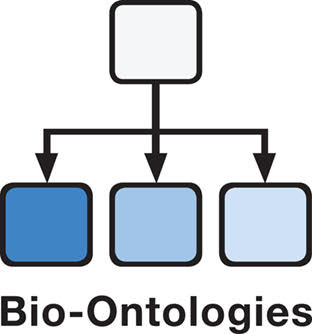 Bio-Ontologies Community of Special Interest Group (COSI) covers the latest and most innovative research in the application of ontologies and more generally the organisation, presentation and dissemination of knowledge in biomedicine and the life sciences. Bio-Ontologies Community of Special Interest Group (COSI) covers the latest and most innovative research in the application of ontologies and more generally the organisation, presentation and dissemination of knowledge in biomedicine and the life sciences.
Bio-Ontologies provides a vibrant environment for reporting novel methods and sharing experiences on the construction and application of ontologies in health care and the life sciences. The informal nature of the COSI offers a constructive environment to nurture discussion of innovative and scientifically sound work that range from preliminary to completed, from both young and experienced investigators alike. Bio-Ontologies participants also benefit from a strongly interdisciplinary setting, where ISMB attendees intermingle with members from American Medical Informatics Association (AMIA) and the W3C’s Healthcare and Life Sciences interest group (HCLSIG), thereby increasing impact through broader dissemination and enabling new and exceptional collaborations.
|
| BioVis: Biological Data Visualization Abstract Area Chairs: Danielle Albers Szafir, University of Colorado at Boulder, United States Thomas Höllt, TU Delft, Netherlands Michael Krone, University of Tübingen, Germany |
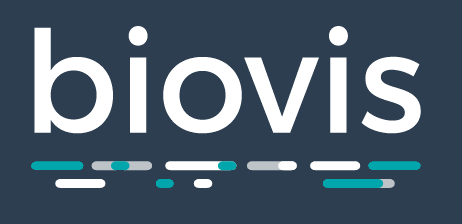 The BioVis track aims to educate, inspire, and engage bioinformatics and biology researchers in state-of-the-art visualization research and visualization researchers in problems in biological data visualization. The BioVis track aims to educate, inspire, and engage bioinformatics and biology researchers in state-of-the-art visualization research and visualization researchers in problems in biological data visualization.The rapid adoption of data-intensive biology approaches creates enormous challenges for computational visualization techniques, which are needed to enable researchers to gain insight from their large and highly complex data sets. The goal of this session is to bring together researchers from the visualization, bioinformatics, and biology communities with the purpose of educating, inspiring, and engaging bioinformatics and biology researchers in state-of-the-art visualization research, as well as visualization researchers in problems in biological data visualization.
Keywords: Visualisation, Visual Analytics, Education |
| BOSC: Bioinformatics Open Source Conference Abstract Area Chairs: Nomi Harris, Lawrence Berkeley National Laboratory, United States
Heather Wiencko, Open Bioinformatics Foundation, Ireland
Learn more about the BOSC COSI here. |
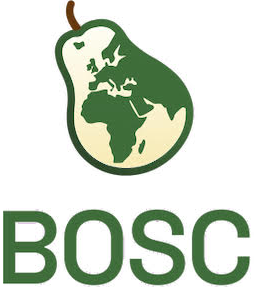 The Bioinformatics Open Source Conference (BOSC) is organized by the Open Bioinformatics Foundation (OBF), a non-profit group dedicated to promoting the practice and philosophy of open source software development and open science within the biological research community. Since its inception in 2000, The Bioinformatics Open Source Conference (BOSC) is organized by the Open Bioinformatics Foundation (OBF), a non-profit group dedicated to promoting the practice and philosophy of open source software development and open science within the biological research community. Since its inception in 2000,
BOSC has provided a forum for developers and users to interact and share research results and ideas in open source bioinformatics. BOSC’s broad spectrum of topics includes practical techniques for solving bioinformatics problems; software development practices; standards and ontologies; approaches that promote open science and sharing of data, results and software; and ways to grow open source communities while promoting diversity within them.
Keywords: Open source; Open science; Open data; Reproducible research; Interoperability; Data science; Workflows; Translational bioinformatics; Diversifying bioinformatics communities |
|
CAMDA: Critical Assessment of Massive Data Analysis |

The large, complex data sets for the Critical Assessment of Massive Data Analysis (CAMDA) contest include built-in truths for calibration. In an open-ended competition, however, both seasoned researchers and cunning students push the boundaries of our field, with unexpected questions or angles of approach often bringing the most impressive advances. The CAMDA track highlights and compares the latest methods and results in an international data analysis contest, with this year's topics including: (1) a meta-genomics forensics challenge of constructing multi-source microbiome fingerprints and predicting the geographical origin of mystery samples, (2) a cancer prognosis data-integration challenge, now with RNA-seq reads for multiple cancer types introducing 300Mb of new human genomic sequence, (3) a CMap drug safety challenge of comparing / integrating multi-track responses of multiple cell lines for predicting drug induced liver injury in humans from cell expression and imaging assays + chemical structures. |
|
CompMS: Computational Mass Spectrometry |
 COSI CompMS promotes the efficient, high-quality analysis of mass spectrometry data through dissemination and training in existing approaches and coordination of new, innovative approaches. COSI CompMS promotes the efficient, high-quality analysis of mass spectrometry data through dissemination and training in existing approaches and coordination of new, innovative approaches. The COSI aims to build a community of scientists working in computational mass spectrometry, to integrate experimental with theoretical research, and to bridge the gap between proteomics, metabolomics, and other MS-driven fields Keyword: computational mass spectrometry, proteomics, metabolomics
|
|
Education: Computational Biology Education |
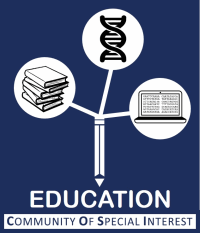
Education-COSI focuses on bioinformatics and computational biology education and training across the life sciences. A major goal of this COSI is to foster a mutually supportive, collaborative community in which bioscientists can share bioinformatics education and training resources and experiences, and facilitate the development of education programs, courses, curricula, etc., and teaching tools and methods.
Keywords: education, training, training resources, curricula, competencies |
|
Evolution and Comparative Genomics |
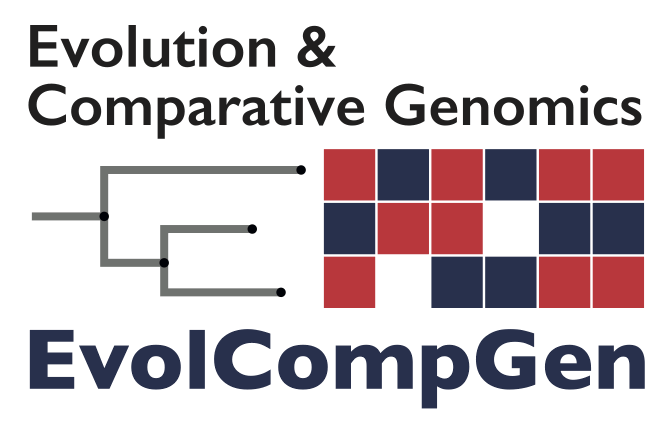 Evolution and comparative genomics are deeply intertwined with computational biology. Computational evolutionary methods, such as phylogenetic inference methods or multiple sequence alignment are widely used, yet remain far from “solved” and are indeed intense areas of research. Evolution and comparative genomics are deeply intertwined with computational biology. Computational evolutionary methods, such as phylogenetic inference methods or multiple sequence alignment are widely used, yet remain far from “solved” and are indeed intense areas of research. At the same time, evolutionary and comparative genomics are inherently “transversal” disciplines in that work in many other biological areas of research have some evolutionary component (e.g. cancer genomics, epidemiology, toxicology, population genetics, functional genomics, structural biology just to name a few). The scope of this COSI is intentionally kept broad. The track will feature a mix of proceedings, highlight, and invited talks. Priority will be given to contributions which are relevant to more than a single area of application, or to contributions which are not covered by more specialised COSIs.
Keywords: Evolution, phylogeny, phylogenomics, comparative genomics, genome rearrangements, orthology, paralogy, recombination, lateral gene transfer, genome variation, population genomics, comparative epigenomics, epidemiology, cancer evolution genomics, genome annotation |
|
Function: Gene and Protein Function Annotation |
 The mission of the Function Community of Special Interest (Function-COSI) is to bring together computational biologists, experimental biologists, biocurators, and others who are dealing with the important problem of gene and gene product function prediction, to share ideas and create collaborations. The mission of the Function Community of Special Interest (Function-COSI) is to bring together computational biologists, experimental biologists, biocurators, and others who are dealing with the important problem of gene and gene product function prediction, to share ideas and create collaborations. The Function COSI features the Critical Assessment of Function Annotation, an ongoing community challenge aimed at improving methods for protein function prediction. The Function-COSI holds annual meetings alongside ISMB. Also, we are conducting the multi-year Critical Assessment of protein Function Annotation, or CAFA, experiment.
Keywords: Protein function prediction, machine learning, performance assessment, |
|
HitSeq: High-throughput Sequencing Abstract Area Chairs:
|
 HiTSeq is a community of special interest devoted to the latest advances in computational techniques for the analysis of high-throughput sequencing (HTS) data. Sessions will be devoted to discussing the latest advances in computational techniques for the analysis of high-throughput sequencing (HTS) datasets and will provide a forum for in-depth presentations of the methods and discussions among the academic and industry scientists working in this field. HiTSeq is a community of special interest devoted to the latest advances in computational techniques for the analysis of high-throughput sequencing (HTS) data. Sessions will be devoted to discussing the latest advances in computational techniques for the analysis of high-throughput sequencing (HTS) datasets and will provide a forum for in-depth presentations of the methods and discussions among the academic and industry scientists working in this field.We seek contributions on any topic involving HTS data analysis including: genome assembly and haplotype phasing; transcriptome analysis; genetics and epigenetics variation; metagenomics and microbiome analysis; and new HTS platform data analysis (e.g. synthetic reads, long reads, nanopore). In addition to general sessions, we propose to have two specialized sessions to focus on current hot topics: a) long sequencing and mapping techniques, b) single cell sequencing applications, c) non-linear genome representations. Both of these topics have generated an enormous amount of interest recently.
Keywords: sequencing, next generation, high throughput, algorithms, assembly, phasing, variation discovery, genotyping, metagenomics, microbiome, long reads, short reads, nanopre, pan-genomes, graph genomes |
|
MLCSB: Machine Learning in Computational and Systems Biology |
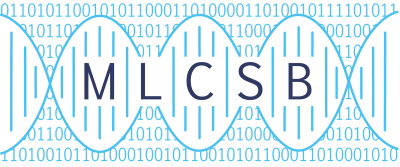 Systems Biology and Machine Learning meet in the MLCSB COSI. The community is the place for researchers of these areas to exchange ideas, interact and collaborate. Systems Biology and Machine Learning meet in the MLCSB COSI. The community is the place for researchers of these areas to exchange ideas, interact and collaborate. Molecular biology and all the biomedical sciences are undergoing a true revolution as a result of the emergence and growing impact of a series of new disciplines and tools sharing the -omics suffix in their name. These include in particular genomics, transcriptomics, proteomics and metabolomics, devoted respectively to the examination of the entire systems of genes, transcripts, proteins and metabolites present in a given cell or tissue type. Taking advantage of this wealth of genomic information has become a conditio sine qua non for whoever has the ambition to remain competitive in molecular biology and in the biomedical sciences in general. Machine learning naturally appears as one of the main drivers of progress in this context, where most of the targets of interest deal with complex structured objects: sequences, 2D and 3D structures or interaction networks. At the same time, bioinformatics and systems biology have already induced significant new developments of general interest in machine learning, for example in the context of learning with structured data, graph inference, semi-supervised learning, system identification, and novel combinations of optimization and learning algorithms.
Keywords: Machine Learning, Data Mining, Deep Learning, Artificial Intelligence in Bioinformatics and Computational Biology |
|
MICROBIOME |
 The MICROBIOME Community of Special Interest aims at the advancement and evaluation of computational methods in microbiome research, especially metaomic approaches. Based on the Critical Assessment of Metagenome Interpretation (CAMI), the COSI supplies users and developers with exhaustive quantitative data about the performance of methods in relevant scenarios. The MICROBIOME Community of Special Interest aims at the advancement and evaluation of computational methods in microbiome research, especially metaomic approaches. Based on the Critical Assessment of Metagenome Interpretation (CAMI), the COSI supplies users and developers with exhaustive quantitative data about the performance of methods in relevant scenarios. It therefore guides users in the selection and application of methods and in their proper interpretation. Furthermore, the COSI provides a platform for exchange and networking between method developers, and provides valuable information allowing them to identify promising directions for their future work.
Keywords: microbiome, computational metaomics, microbial networks, pathogens, symbionts, (meta)omics-based diagnostics, microbial ecology and evolution
|
|
NetBio: Network Biology |
 As large scale, systems-level data are becoming increasingly available, modeling and analyzing them as networks is widespread. Network Biology Community serves to introduce novel methods and tools, identify best practices and highlight the latest research in the growing and interdisciplinary field of network biology. As large scale, systems-level data are becoming increasingly available, modeling and analyzing them as networks is widespread. Network Biology Community serves to introduce novel methods and tools, identify best practices and highlight the latest research in the growing and interdisciplinary field of network biology.Keywords: networks, pathways, systems, network analysis, disease networks, disease pathways |
|
RegSys: Regulatory and Systems Genomics |
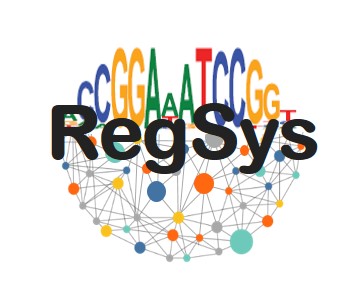 Regulatory genomics involves the study of the genomic control system, which determines how, when and where to activate the blueprint encoded in the genome. Regulatory genomics is the topic of much research activity worldwide. Since computational methods are important in the study of gene regulation, the RegSys COSI meeting focuses on bioinformatics for regulatory genomics. Regulatory genomics involves the study of the genomic control system, which determines how, when and where to activate the blueprint encoded in the genome. Regulatory genomics is the topic of much research activity worldwide. Since computational methods are important in the study of gene regulation, the RegSys COSI meeting focuses on bioinformatics for regulatory genomics. An important goal of the meeting is to foster a collaborative community wherein scientists convene to solve difficult research problems in all areas of computational regulatory genomics.
Keywords: 1. Genomic and epigenomic regulatory elements (transcription factors, enhancers, histones, gene promoters, regulatory motifs, non-coding RNAs, etc.) 2. NGS methods in regulatory genomics (e.g., ChIP-seq, RNA-seq, ATAC-seq) 3. Epigenetics and epitranscriptomics 4. Alternative splicing 5. Regulatory networks and pathway analysis 6. Genetic, molecular, and phenotypic variation in human disease 7. DNA shape 8. Single-cell transcriptomics (and other single cell assays) 9. 3D genomics (e.g., Hi-C and ChIA-PET) 10. Regulatory evolution or comparative regulatory genomics |
|
RNA: Computational RNA Biology Learn more about the IRB COSI here
|
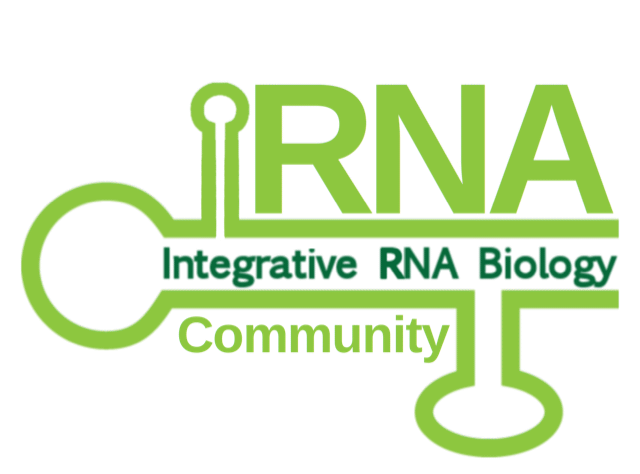 RNA track covers the full range of research topics in the field of RNA Biology, from computational and high-throughput experimental methods development to their application in different aspects of RNA processing, structure, and function. RNA track covers the full range of research topics in the field of RNA Biology, from computational and high-throughput experimental methods development to their application in different aspects of RNA processing, structure, and function. The goal of the Computational RNA Biology session is to bring together experts in computational and experimental aspects of research in RNA Biology to cover new developments across this broad field of research. The meeting focuses on two major areas: (1) the development of computational and high-throughput experimental methods, and (2) the application of such methods to break new grounds in the study of RNA biology and disease. We aim to educate and inspire researchers in the field, novice and seasoned alike, by meshing together different aspects of Computational RNA Biology, and promoting cross-disciplinary collaborative research.
Keywords: Transcriptomics, RNA processing, post-transcriptional regulation, non-coding RNA, RNA 2D/3D structure, alternative-splicing, alternative polyadenylation, RNA translation degragation and localization, genetic variants effect on RNA processing, RNA and disease. |
|
SysMod: Computational Modeling of Biological Systems |
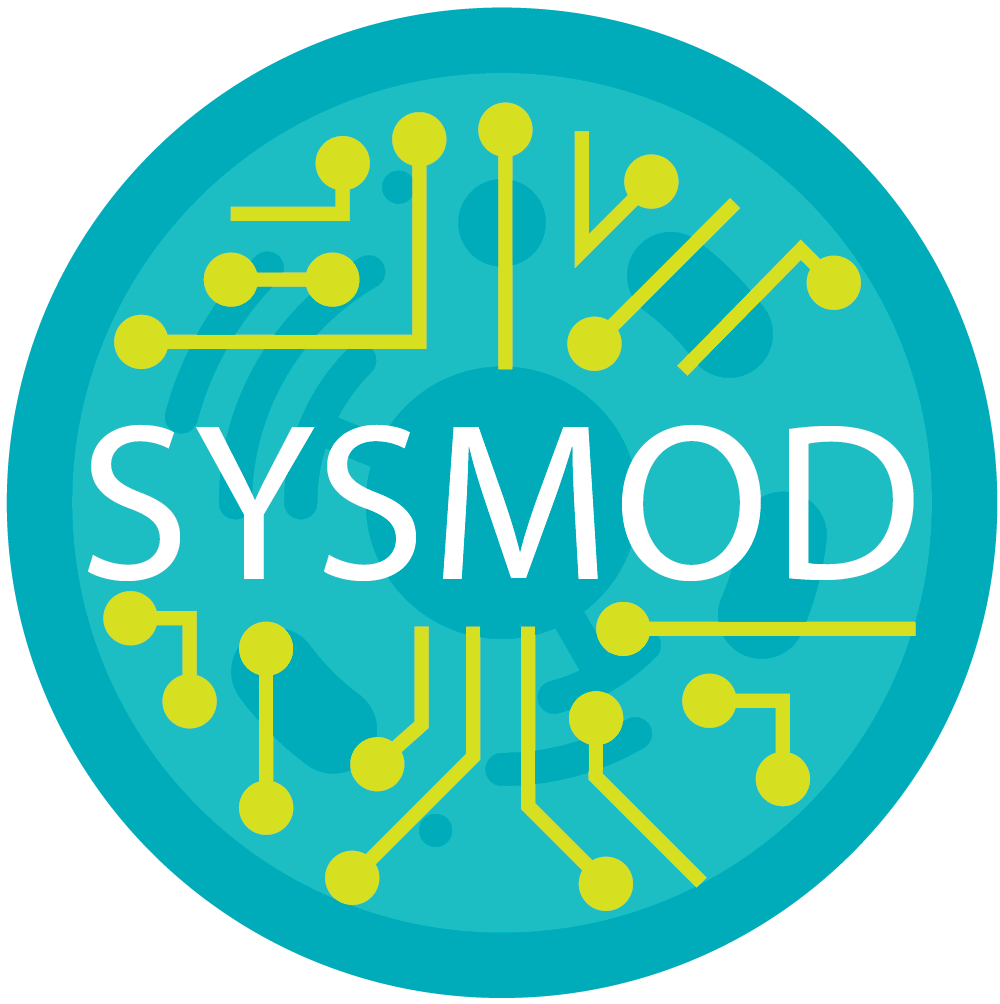 The Computational Modeling of Biological Systems (SysMod) aims to create a forum for systems modelers and bioinformaticians to discuss common research questions and methods. The session will focus on the conjoint use of mathematical modeling and bioinformatics to understand biological systems functions and dysfunctions. The Computational Modeling of Biological Systems (SysMod) aims to create a forum for systems modelers and bioinformaticians to discuss common research questions and methods. The session will focus on the conjoint use of mathematical modeling and bioinformatics to understand biological systems functions and dysfunctions. The meeting is open to the full range of methods used in systems modeling, including qualitative and quantitative modeling, dynamical and steady-state modeling, as well all applications of systems modeling including basic science, bioengineering, and medicine.
Keywords: computational modeling, constraint-based models, logical models, kinetic models, multi-scale models |
| Text Mining for Biology and Healthcare Abstract Area Chairs: Cecilia Arighi, University of Delaware, United States Lars Jensen, University of Copenhagen Robert Leaman, NLM, NIH, United States Zhiyong Lu, NLM, NIH, United States Learn more about the Text Mining Special Session here |
This session brings together researchers that create text mining tools with researchers who currently use or are interested in using text mining tools to make new discoveries. The primary goal is to link at least two distinct audiences: those who are not text mining specialists, but who could use the results in their work (e.g., bioinformaticians and computational biologists),
and biomedical text mining specialists who develop new methodologies to advance the state of the art. The session will focus on text mining use cases (concrete problems with scientific importance) in addition to methodology development.
|
|
TransMed: Translational Medical Informatics Abstract Area Chairs: Learn more about the TransMed COSI here |
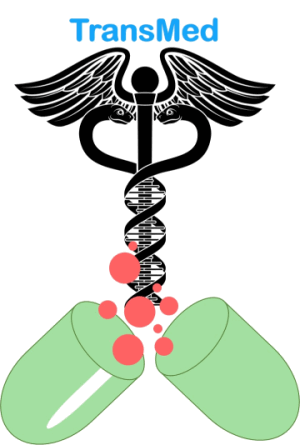 TransMed covers the current developments in the field of clinical and translational medicine informatics. Analysis of large amounts of multi-omics, imaging (medical and molecular), mobile sensor, clinical and health records data is paving the way for precision medicine. In the TransMed track, we will explore the current status of computational biology and advance machine learning approaches within the field of clinical and translational medicine. TransMed covers the current developments in the field of clinical and translational medicine informatics. Analysis of large amounts of multi-omics, imaging (medical and molecular), mobile sensor, clinical and health records data is paving the way for precision medicine. In the TransMed track, we will explore the current status of computational biology and advance machine learning approaches within the field of clinical and translational medicine. This opens the debate on current state-of-the-art data infrastructures for translational medicine data integration and analysis. A variety of computational approaches are currently being used to harmonize and relate molecular data to clinical outcomes in order to better understand disease conditions. These methods also have the potential to discover biomarkers for early detection of disease, and targets for drug discovery, and to be used predictively to help to suggest personalised therapeutic strategies for patients. In this session we will bring scientists from both academia and industry to exchange knowledge and foster networking, to help in building up of the translational medicine community. .
Keywords: Translational medicine; clinical and ‘omics data integration; curation and harmonization; stratification of patients; informatics for integrating biology and the bedside; medical informatics; ontology-driven data representation; patient centered outcomes research; cohort data; deep learning |
|
VarI: Variant Interpretation |
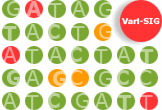 The VarI COSI meeting is dedicated to the recent advances in the analysis and interpretation of the genetic variants. The VarI COSI meeting is dedicated to the recent advances in the analysis and interpretation of the genetic variants. The meeting aims to organize a research network (VarI-COSI) facilitating the exchange of ideas and the establishment of new collaborations between researchers with different expertise. The VarI-COSI meeting is broadly divided in two sessions (“Genetic variants as markers: evolution, populations, GWAS” and “Genetic variants as effectors: function, structure, and regulation”) that encompass the four major research topics of the field: 1) Databases, data mining algorithms and visualization tools for variants analysis. 2) Methods for predicting regulatory/structural/functional impacts of SNVs. 3) Personal Genomics, GWAS studies and SNV prioritization. 4) Population genomics and phylogenetic analysis.
|
|
Abstract Chair: |
Novel techniques in emerging areas of computational biology, including intersections with other fields. |
Abstracts: Deadlines
Any recent research, published or unpublished is eligible for submission and should be received by April 11, 2019. Acceptance notifications will be sent no later than Thursday, May 9, 2019.
The conference will accept late posters abstracts beginning April 15, 2019.
Poster only submissions DO NOT require any materials to be uploaded. Submissions are evaluated on the 200 word text abstract provided during submission.
Abstracts: Submission Guidelines
The presenter should be identified during the submission process. Presenters of accepted abstracts are required to make the presentation themselves, and must register and pay to attend the conference.
Submitters may choose to have their submission reviewed for: talk and poster or poster only. If you select talk and poster and are unsuccessful for a talk your abstract will automatically be considered for a poster presentation.
During submission you will submit to the COSI track that most reflects your research area. You will have the option to identify two other COSI tracks that may also be suited to your research area during the submission process.
If you submit an abstract by the April 11, 2019 deadline, you will be notified whether or not your abstract has been accepted by May 9, 2019 and you may be eligible to apply for a Conference Travel Fellowship.
- All abstracts must be submitted using the conference submission site by the abstract deadline: April 11, 2019 (You have until 11:59 p.m. Eastern Time Zone).
- Accepted abstracts (maximum 200 words) will be posted on the conference web site. For authors requesting a talk you should upload a long abstract of up to two (2) pages in PDF format during the submission process. *Do not submit more than two pages* It is best to check individual COSI websites for specific information regarding program goals and guidelines.
- The 200 word abstract should be a brief and concise summary of the background/motivation for the study, method and result(s), as well as conclusion/statement of significance. The additional uploaded pdf can be used to provide additional details, as well as figures and graphics that support the main points of the abstract.
Your abstract, including the two (2) page PDF, does not need to contain your title/position or any personal information (e.g. affiliation) as these details are collected during the EasyChair submission process.
Selected Abstract talks will be presented in tracks that run in parallel at the conference. The length of a talk is determined by individual COSI tracks. Oral presentation schedules for abstracts will be announced after acceptance notifications directly by the COSI track organizers.
Abstracts: Review Criteria
All submissions will be evaluated by a program committee. Submitters may choose to have their submission reviewed for talk and poster or poster only. If you select talk and poster and are unsuccessful for a talk your abstract will automatically be considered for a poster.
Posters advertising commercial software will be rejected from this poster session and/or removed from the conference without notice. There is a separate space for such posters in the exhibition area. If you have an industry poster, contact This email address is being protected from spambots. You need JavaScript enabled to view it..
Poster Details for ISMB/ECCB
Posters Presentations at ISMB/ECCB 2019
During ISMB/ECCB 2019 two separate poster sessions will be held: Session A, July 22 and 23 and Session B, July 24 and 25. Each session has a set time for authors to be available to present their poster as noted below.
Poster presenters are asked to have their posters on display for the full duration of either session A or B. Poster numbers will be posted beginning June 24, 2019.
Poster Session A: (July 22 and July 23)
Session A: Poster Authors Presentation Schedule for July 22, 6:00 pm – 8:00 pm
3DSIG: Structural Bioinformatics and Computational Biophysics
BioVis: Biological Data Visualization
Function: Gene and Protein Function Annotation
HitSeq: High-throughput Sequencing
RegSys: Regulatory and Systems Genomics
SysMod: Computational Modeling of Biological Systems
TransMed: Translational Medical Informatics
Special Session (SST01): Text Mining for Biology and Healthcare
Session A: Poster Authors Presentation Schedule for July 23, 6:00 pm – 8:00 pm
Bio-Ontologies
CompMS: Computational Mass Spectrometry
Evolution & Comparative Genomics
Microbiome
NetBio: Network Biology
Session A Poster Set-up and Dismantle
Session A Posters set up: Monday, July 22 between 7:30 am - 10:00 am
Session A Posters should be removed at 8:00 pm, Tuesday, July 23.
Session B: (July 24 and July 25)
Session B: Poster Authors Presentation Schedule for July 24, 6:00 pm – 8:00 pm
BOSC: Bioinformatics Open Source Conference
CAMDA: Critical Assessment of Massive Data Analysis
Education: Computational Biology Education
Machine Learning in Computational and Systems Biology
RNA: Computational RNA Biology
VarI: Variant Interpretation
General Computational Biology
Session B Poster Set-up and Dismantle
Session B Posters set up: Wednesday, July 24 between 7:30 am - 10:00 am
Session B Posters should be removed at 2:00 pm, Thursday, July 25.
Late Posters
Abstracts submitted and accepted as part of the Call for Late Posters (opens April 15, 2019) are NOT eligible to apply for Conference Travel Fellowship Support. Call for Late Posters closes May 15, 2019 11:59 p.m. Eastern Time Zone
The conference organizers will not offer tables for laptop computer demos during the poster session. If you would like to demonstrate your software, you are encouraged to submit an application for Technology Track. All abstracts will be considered a "personal communication" to the conference attendees. Abstracts will not be published in the proceedings, but will appear on the conference website and app.
Institutional Research
Not-for profit research institutes and universities are able to submit their research findings as part of the call for posters. This will be displayed with in the topic area of Institutional Research.
Reviews of fields or techniques
Individuals may choose to submit a poster presenting a review of a specific field or technique. These submissions do not need to contain original work from the author and are intended to be an introduction for individuals not familiar with the field or technique. These review are not meant to be advertisements (e.g. it is not acceptable that the poster is an advertisement for a book or other type of commercial publication)
Poster Display Size:
Attention Poster Authors:
Recommended poster size is A0 size (84.1cm wide and 118.9cm)
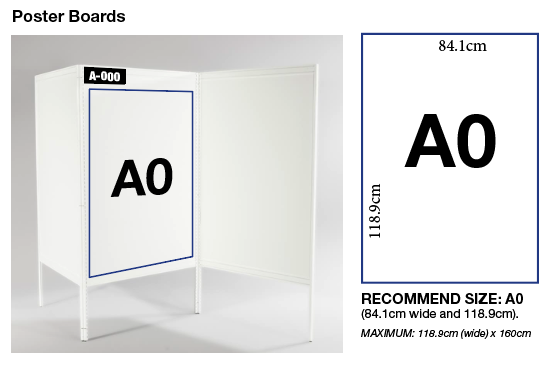
Print Your Poster In Basel
Delegates wishing to have their poster printed in Basel can contact This email address is being protected from spambots. You need JavaScript enabled to view it. to make arrangements.
Pricing for A0 size which is 84.1cm wide and 118.9cm, is 85.00 CHF (includes VAT). Payment can be made with Visa or Master Card.
Please provide the printer the poster no later than July 15 to ensure your poster is ready.
Thoma Druck AG
Emmanuel Thoma
Friedensgasse 1 4056 Basel
Telephone: +41 61 264 97 00
This email address is being protected from spambots. You need JavaScript enabled to view it.
Poster contact email: This email address is being protected from spambots. You need JavaScript enabled to view it.
FAQ
Q: Can I submit more than one abstract?
A: Yes, but although having the same person deliver more than one talk is permitted, it is not encouraged. Also, although a poster presenter may present two posters (one in Poster Session A and one in Poster Session B), we encourage labs to involve multiple presenters.
Q: Should I submit a PDF of my poster when completing my submission?
A: No, please only submit the poster abstract. You will bring your physical poster to the conference to present.
Q: Can previously accepted work be considered for a poster?
A: Yes, we do ask that you note the year the work was published and provide the Digital Object Identifier (DOI) during the submission process.




